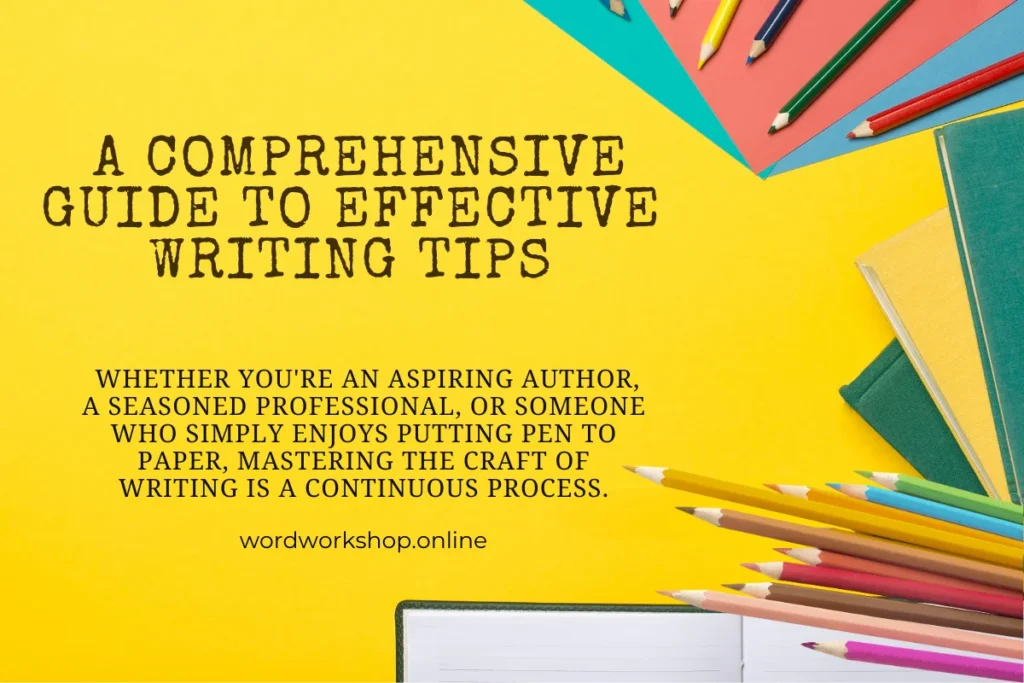Writing, often hailed as both an art and a skill, is a journey filled with creativity, challenges, and the constant pursuit of improvement. Whether you’re an aspiring author, a seasoned professional, or someone who simply enjoys putting pen to paper, mastering the craft of writing is a continuous process. In this guide, we’ll explore a diverse range of writing tips that encompass various aspects of the creative process, from overcoming writer’s block to refining your prose.
1. Start with a Strong Foundation: Planning and Outlining
The journey of a thousand words begins with a single idea, but a well-structured plan can turn that idea into a compelling narrative. Before diving into your writing, take the time to outline your thoughts. Create a roadmap for your piece, outlining key points, themes, and the overall structure. This initial step not only provides clarity but also serves as a guidepost to keep you on track.
2. Embrace the Writing Process: First Drafts Are Meant to be Messy
Perfection is the enemy of progress, especially in the realm of writing. Allow yourself the freedom to write a messy first draft. Focus on getting your ideas down on paper without worrying too much about refinement. The first draft is a canvas; the editing process is where you mold it into a masterpiece.
3. Overcoming Writer’s Block: Embrace Creative Exercises
Writer’s block is a common hurdle, but there are ways to overcome it. Engage in creative exercises to stimulate your mind and break through mental barriers. Try free writing, prompt-based writing, or even experimenting with a different writing style. These exercises can reignite your creativity and provide a fresh perspective on your work.
4. Show, Don’t Tell: Paint Vivid Imagery with Descriptive Language
One of the cardinal rules of effective writing is the principle of “show, don’t tell.” Instead of explicitly stating facts, use descriptive language to paint vivid imagery in the minds of your readers. Engage the senses, evoke emotions, and create a more immersive reading experience.
5. Edit Ruthlessly: Polish Your Prose
Editing is where the real magic happens in writing. Approach the editing process with a critical eye. Trim unnecessary words, refine sentences for clarity, and ensure a seamless flow from one paragraph to the next. Don’t be afraid to make substantial changes if it enhances the overall quality of your work.
6. Seek Feedback: Embrace Constructive Criticism
Writing is a solitary endeavor, but seeking feedback is crucial for growth. Share your work with trusted friends, writing groups, or mentors. Embrace constructive criticism and use it as a tool to refine your craft. A fresh perspective can uncover blind spots and help you see your work from a different angle.
7. Develop a Consistent Writing Routine: Cultivate Discipline
Consistency is key in honing your writing skills. Establish a writing routine that works for you, whether it’s a specific time of day, a dedicated writing space, or a daily word count goal. Cultivate discipline, and over time, you’ll find that your writing becomes more fluid and your productivity increases.
8. Read Widely: Expand Your Literary Horizons
Good writers are also avid readers. Expose yourself to a diverse range of genres, styles, and authors. Reading widely not only enhances your understanding of different writing techniques but also sparks inspiration by introducing you to new ideas and perspectives.
9. Master the Art of Dialogue: Bring Characters to Life
Dialogue is a powerful tool in storytelling. Master the art of crafting authentic and engaging dialogue. Pay attention to rhythm, tone, and the unique voices of your characters. Well-executed dialogue can bring your characters to life and add depth to your narrative.
10. Know Your Audience: Tailor Your Message
Understanding your audience is essential for effective communication. Tailor your writing to resonate with your target readers. Consider their preferences, interests, and expectations. A well-crafted piece that connects with your audience will leave a lasting impression.
11. Embrace Simplicity: Clarity Trumps Complexity
While eloquence is admired, clarity is paramount. Aim for simplicity in your writing. Avoid unnecessary jargon or convoluted sentences. A clear and concise message is more likely to resonate with readers and leave a lasting impact.
12. Stay Inspired: Cultivate a Writing-friendly Environment
Creativity flourishes in a conducive environment. Create a writing-friendly space that inspires you. Surround yourself with things that ignite your imagination, whether it’s books, artwork, or soothing music. A well-crafted environment can boost your motivation and enhance your writing experience.
Nurturing the Writer Within
Writing is not just a skill; it’s a journey of self-discovery and continuous improvement. By incorporating these writing tips into your routine, you’ll be better equipped to navigate the challenges, celebrate the victories, and evolve as a writer. Embrace the process, stay curious, and remember that the most profound stories often emerge from the genuine and passionate voice of the writer.
Whether you’re crafting fiction, non-fiction, or poetry, the power of your words lies in your ability to connect with your audience, evoke emotions, and leave a lasting imprint on the hearts and minds of your readers. Happy writing!




I very delighted to find this internet site on bing, just what I was searching for as well saved to fav
Thank you! You are who we do these blogs for. We appreciate your comment. Please subscribe to our newsletter to stay updated on our newest blog releases.
Virtually Yours,
Cindy